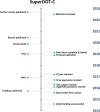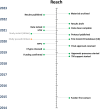Lessons learned from two multicentre randomised controlled trials undertaken in pharmacies in community settings: a retrospective project management analysis
- PMID: 41174772
- PMCID: PMC12577213
- DOI: 10.1186/s13063-025-09196-9
Lessons learned from two multicentre randomised controlled trials undertaken in pharmacies in community settings: a retrospective project management analysis
Abstract
Background: Community pharmacists are the most publicly accessible health professionals in high-income countries. There is increasing interest in conducting randomised controlled trials (RCT)-the benchmark of original evidence in the medical field-in community pharmacies. However, little evidence exists examining the challenges and opportunities of conducting RCTs in pharmacies, particularly with respect to project management. In this work, we aim to provide a narrative of lessons learned in conducting two RCTs in community pharmacies in two high-income countries.
Methods: We retrospectively reviewed multiple data sources including administrative and trial activity records. We conducted face-to-face and online sessions to create a list of lessons learned from our experiences and created a stakeholder map for the trials examined. We framed our findings using the Project Managements Institute's model of the project life cycle, and descriptive statistics were used to estimate the outcomes reported.
Results: Ninety-six pharmacies were recruited. Across the project phases, seven high-level tasks within Initiation; 30 within Planning, 43 within Execution/Monitoring and Controlling, and 14 in Closure, were identified. Recruitment of pharmacies, developing documentation for trial drug supply, participant recruitment, and negotiation with pharmacy contracting bodies took longest to complete. Eight key stakeholder groups were identified, including public services/agencies; community pharmacies, communications actors; funders/sponsors; universities/research institutes; healthcare providers; suppliers; and regulators. Thirty lessons were identified, most critically across engaging and managing stakeholders; selecting and supporting trial sites; streamlining trial processes to minimise burden; optimising data collection and accuracy; and considering pharmacy constraints and costs.
Conclusions: Conducting RCTs in community pharmacies presents unique challenges across the project life cycle. Key lessons include the importance of early planning, streamlining processes to reduce staff burden, and addressing pharmacy constraints. The complexity of the work necessitates dedicated and well-resourced trial management staff to enhance stakeholder management and offer tailored supports where required.
Trial registration: Not applicable.
Keywords: Community pharmacy; Lessons learned; Project management; Randomised controlled trials.
© 2025. The Author(s).
Conflict of interest statement
Declarations. Ethics approval and consent to participate: Not applicable: this work did not require human or animal ethical approval. Consent for publication: Not applicable: not participants were recruited to this work. Competing interests: CJB reports honoraria from the International Network for Health and Hepatitis in Drugs Users (INHSU) and research funding from the Scottish Society of Physicians (SSP) outside of the submitted work. SKI reports no competing interests. AR reports he has received research grants from Gilead, Bristol Myers Squibb, Abbvie and Roche and has received honorariums from Gilead and personal fees from Abbvie. LJB reports grants from NIHR outside the submitted work. MDP reports no competing interests. KA reports no competing interests. NP reports no competing interests. BH reports personal fees and other from Abbvie, personal fees and other from Gilead, outside the submitted work. JSD reports funding to his institution for investigator-initiated research from Gilead Sciences and Abbvie; and honoraria to his institution for educational events from AbbVie. JFD has received research grants and lecture honoraria from MSD, AbbVie and Gilead, outside of the submitted work.
Figures




References
MeSH terms
LinkOut - more resources
Full Text Sources

